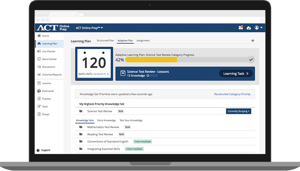Why Personalization Should Be a Crucial Part of Your Learning Program
Adaptive learning technologies have had a major impact on the way corporate trainers think about education, and for good reason. Adaptive, or personalized learning techniques, have become popular for their proven ability to help each learner effectively gain demonstrable proficiency in a learning objective.
Every learner is unique. Those in similar, or even the same roles, have varied skill levels, individual strengths and weaknesses, and come from different backgrounds, thus requiring different levels of training. One-size-fits-all learning programs no longer serve as the most efficient or effective way to successfully teach a group of learners. Today, eLearning platforms allow courses to modify user activity by making recommendations based on their performance and interest levels in real-time.
Learners want personalization
LinkedIn’s 2018 Workplace Learning Report says that 58% of employees prefer to learn at their own pace. If learners are particular on pace, you can bet they’re also particular about how they spend their time and the content that’s being delivered. Offering an effective way that best suits the needs of learners and enables them to achieve proficiency will help alleviate some of the top challenges L&D departments face today, which include:
- Setting up learners for success with better time management: A personalized learning approach can cut in half the amount of time it takes a typical learner to achieve mastery. Because adaptive programs cater to each learner’s specific skills, there is no need to reteach what people already know, guiding them to spend more time on areas where they need to build stronger competencies.
- Finding competent, skilled employees to drive your organization: The source for many workplace errors stem from unconscious incompetencies in which a learner isn’t aware that a skill or knowledge gap exists for a skill they could either learn or improve on. An effective training platform can identify a learner’s strengths and weaknesses and measure those against what their true competency for a particular role should be.
- Maintaining high engagement and dropout rates: Through our data, we’ve found that a personalized learning pathway improves user engagement by almost 100%. If a learner knows a program is catered to their individual knowledge and performance history, the more likely they are to devote time, set goals, and ultimately value the training process as a means to their success.
The power of data to drive personalized learning:
We’ve covered why personalization is important to your learners and for your learning strategy. Here at BenchPrep, it’s important to us too. Our platform is built to ensure users have personalized pathways to facilitate more effective, efficient, and enjoyable learning.
 How do we do it? Our own custom-built learning engine. Read our two-part series on how BenchPrep’s platform ranks content using data collection through a process called Learning Engine Optimization (LEO) and how we then use that data to create adaptive study plans.
How do we do it? Our own custom-built learning engine. Read our two-part series on how BenchPrep’s platform ranks content using data collection through a process called Learning Engine Optimization (LEO) and how we then use that data to create adaptive study plans.
Creating a better certification process
Many companies are going through the challenge of how to offer a personalized learning experience and often don't know where to turn. BenchPrep's partnership with HR Certification Institute® (HRCI®), a premier, nonprofit credentialing organization for human resources, demonstrates how an organization went from identifying shortcomings in their learning program to transforming it into a successful driver for growth.
Check out our case study to see how BenchPrep works with HRCI to build custom ‘bundled’ learning programs to ensure candidates have a personalized, seamless, and successful learning path.






